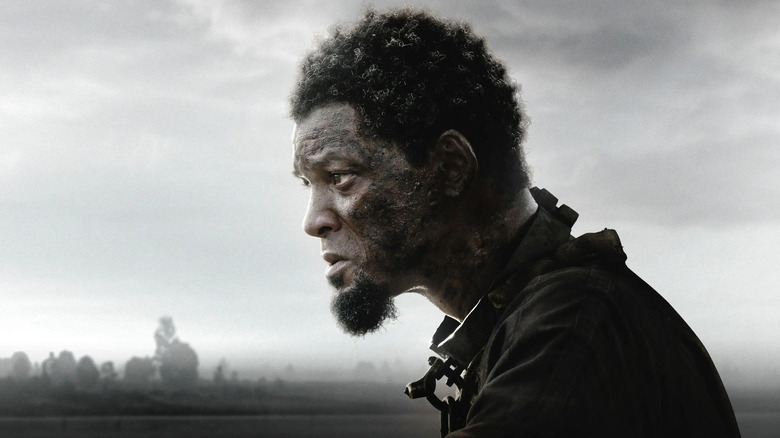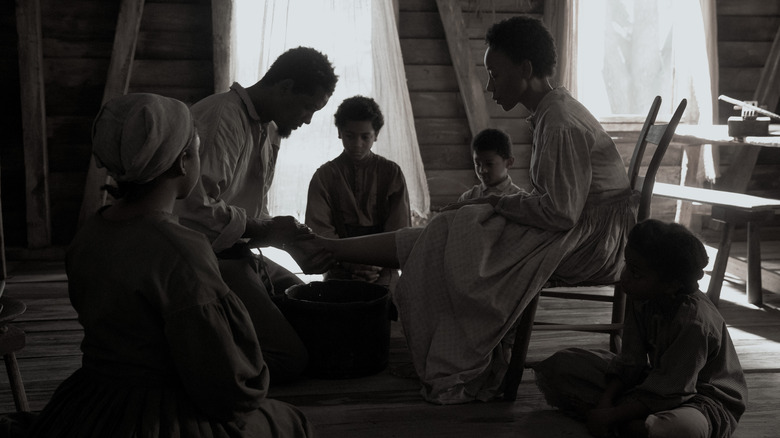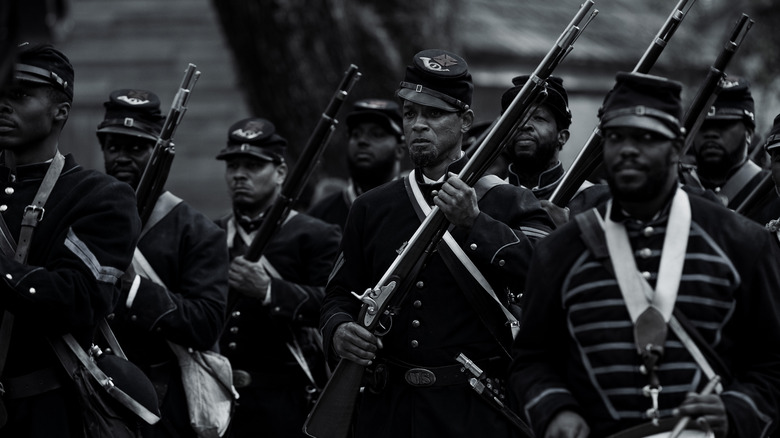Emancipation Review: Will Smith's Latest Biopic Bores
- Some engaging action in the final act
- Addresses an interesting gray area in Civil War discourse
- Just about everything else
In the annals of "almost was" but "never were," Will Smith turning down the lead role in Quentin Tarantino's "Django Unchained" remains an infamous "what if" within the world of alternate reality casting decisions. Though he had always shied away from slave movies as a genre, the Oscar winner claimed his rationale for turning down the part was his aversion to the film's violent and vengeful nature, lamenting Tarantino's decision to not make the film more of a love story. A decade later, and some months removed from a regrettable bit of violence at the Oscars staining Smith's otherwise spotless reputation, here he is as the face of "Emancipation," a violent and disquieting film about slavery that tries to couch its grotesque, repetitive nature in a flat semblance of romance. It is one of the most unique failures in recent prestige picture history.
Directed by "Training Day" helmer Antoine Fuqua, "Emancipation" is presented as one of the bigger, more ambitious projects Apple's Originals program has developed, with Smith starring as Peter, the real-life free slave from the tragically iconic "whipped Peter" photograph first used to show the real-life scars of chattel slavery. But what is intended to be a somber and affecting journey for a man to be reconnected with his family and finally gain his freedom feels like an endless slog, with nothing new to say or think that other films exploring the time period haven't already done better.
Congratulations to anyone who bet the long odds on Will Smith doing something more embarrassing and damaging to his artistic reputation than slapping Chris Rock on live television. You may collect your winnings at the pay window.
Deja vu
When we meet Peter (Smith), he's still with his family, tending to his wife Dodienne (Charmaine Bingwa) and establishing to the audience how much Christianity and an innate love of the Lord center him. His faith fails to waiver throughout the film, even as he's torn from his family and sold to a confederate worker camp building train tracks and munitions. Peter holds to the belief that he will reunite with his family, but it isn't until he and other men in chains overhear two white men overhear news of Abraham Lincoln's Emancipation Proclamation that he gets the drive to escape the camp in the hopes of making it to Lincoln's army.
The film is then segmented into three acts. The first is a truncated "escape" picture structured like a particularly unimaginative prison break exercise. We spend a little too much time witnessing the same tired imagery of abuse and subjugation that it somehow manages to feel boring instead of harrowing. Then, once Peter and some of his compatriots begin their getaway, the film gives way to a chase picture — only the journey is so overwrought and flatly executed. Watching Will Smith limp through the swamp for 30 minutes feels like three hours. Even intermittently and inconsistently cutting away to his family's trials and tribulations back at the plantation he had to leave them at does little to nothing in the way of helping the viewer really invest in the film's chief drama.
But the final act is the closest the film comes to feeling like a worthwhile exploration of this era and not just an extended, thirsty prestige retread. Antoine Fuqua comes alive once Peter makes it to the union, where what he believed would be a straightforward win turns out to be something else entirely. He is now a free man, but he's only free in the sense that he's no longer literally a slave, as he has no choice but to enlist in the army and get sent into unwinnable battles the white soldiers don't want to risk themselves for. It's a fascinating little chapter. Fuqua gets to let loose with the action and film some stirring battle sequences, seeming more interested and engaged behind the camera than he has the rest of the runtime, while the audience gets to ponder the complexity of civil war politics, and how the North had their own troubling preoccupations to contend with.
Unfortunately, there is so little else here to sink one's teeth into. Everything else of any intrigue feels poorly reproduced from other recent works. Ben Foster plays a dogged slave catcher who could easily be mistaken for similar yet superior turns from Christopher Meloni on WGN's canceled series "Underground" or Joel Edgerton in Barry Jenkins' Amazon miniseries "The Underground Railroad." Bingwa is a fine actress, but she's not given enough screen time for her subplot involving the lengths she'll go to keep her family together to carry the same weight as countless subplots from the aforementioned television series, or even Steve McQueen's "12 Years a Slave."
Where have I seen this before?
It's so fascinating to compare "Emancipation" to "Django Unchained." For all its awards season posturing, this new film isn't really any less violent than Tarantino's spaghetti western take on the history lesson. The two films share a cinematographer in Robert Richardson, although his images here are the least inspired he's lensed in decades. Fuqua seems to be channeling "Schindler's List" with the visuals here, aping Steven Spielberg and Janusz Kaminski's black and white photography with deliberate injections of color. Only here, the black and white feels less stark and more artfully desaturated, with specific elements throughout, like skin tones and bloodshed dialed up in brief bursts of intensity.
But while many criticized "Django" for its exploitation cinema background and fanciful stylization, "Emancipation" seems almost proud to toe the line of conservatively clinical storytelling, of providing white audiences with the same maudlin recreation of a bygone era most black viewers are perfectly happy to avoid revisiting. It's exhausting to watch black pain so reliably trotted out in the hopes of furnishing some rich man's frivolously decorated home with more statuettes to polish. It's even more insulting and exhausting to watch here knowing full well the only good reason for Smith to have made a movie like this was for an Oscar when he's already got one now, and he's literally barred from attending the next show.
Smith may as well either commit full-time to the influencer life he's crafted and give in to living out his days as a brand and not a real performer, or at least abandon his tired habit of bad accents and puppy dog facial expressions whenever it's time to make a real drama. No one, least of all this reviewer, will judge him for making "Men in Black" riffs for the rest of eternity.


